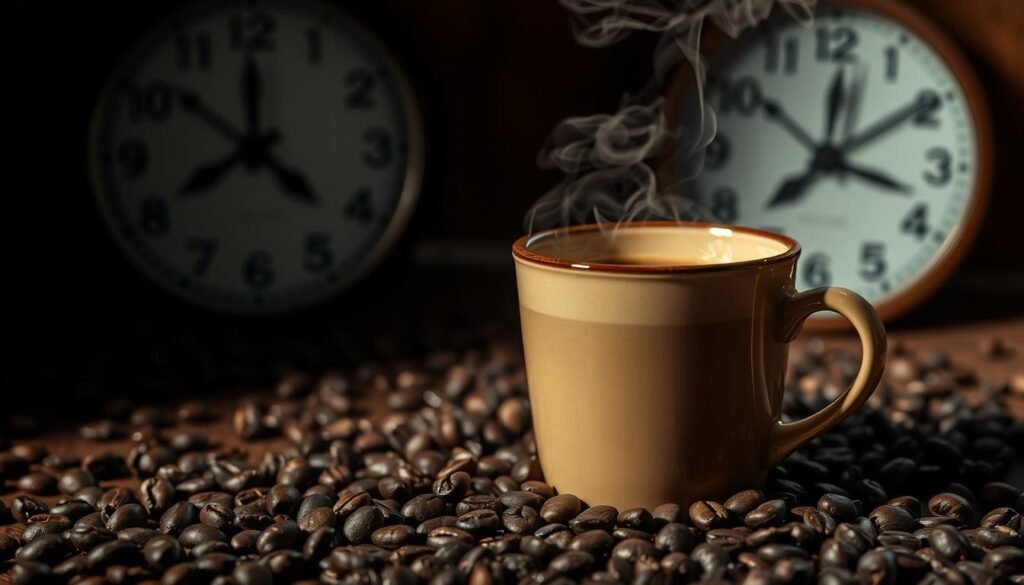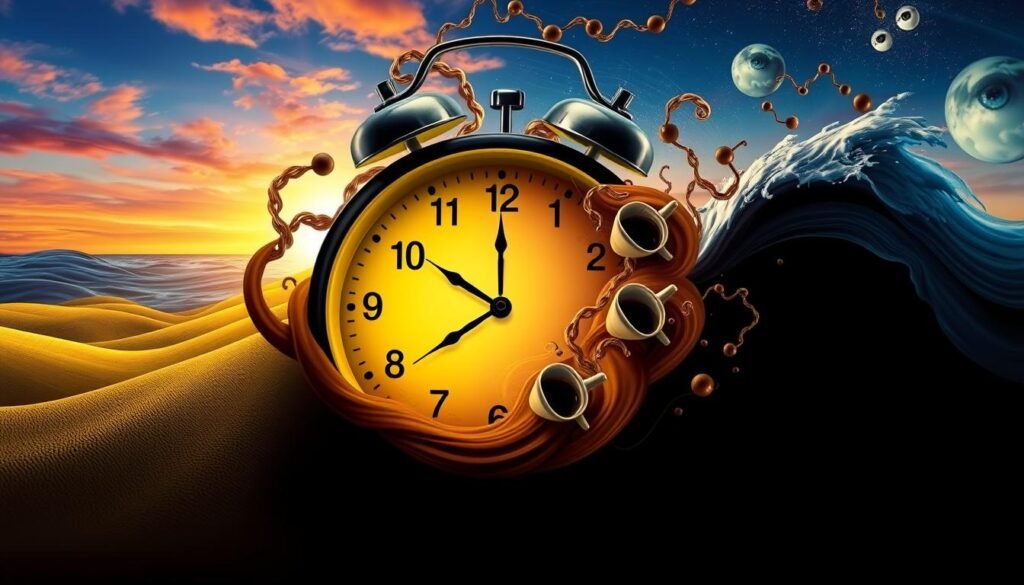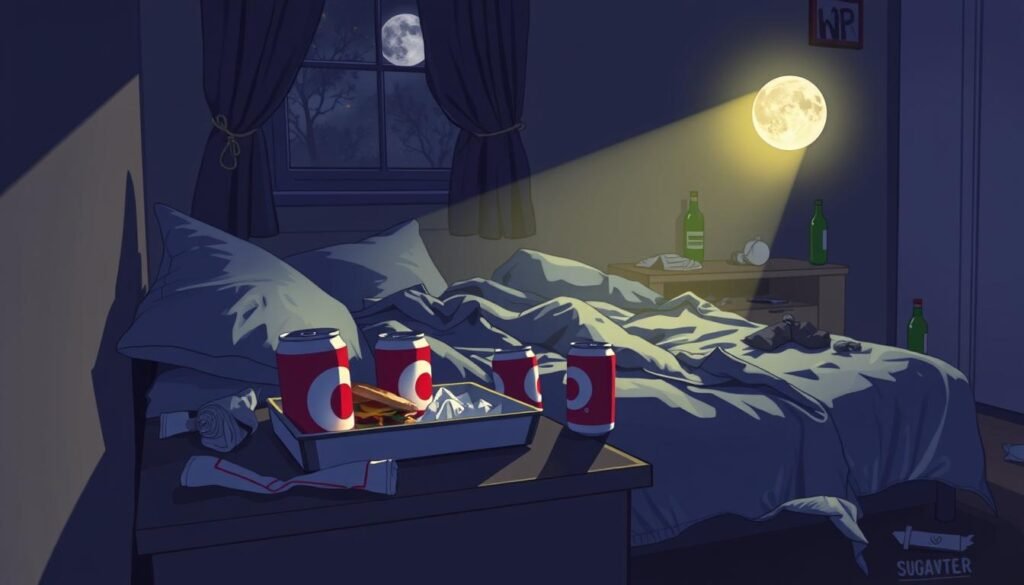Did you know only 17% of young women aged 19-25 feel they sleep well? Studies show eating more added sugars can make sleep worse, with a p-value of .014. This shows how important our diet is for getting a good night’s rest. This article looks into how sugar and caffeine disturb our sleep, affecting our health and daily life.
Research has found eating a lot of sugar can make insomnia and other sleep issues more likely. Caffeine makes this problem bigger by making it tough to both fall and stay asleep. We see that sugar and caffeine are not just about nutrition. They play a big role in how well we sleep.
Key Takeaways
- Only 17% of female university students report good sleep quality.
- Consumption of added sugars is significantly associated with poor sleep quality.
- High sugar intake is linked to increased instances of insomnia and sleep disorders.
- Lowering caffeine intake before bed can improve sleep duration and quality.
- 88% of afternoon caffeine consumers experience at least one sleep problem.
Understanding Sleep Quality
Sleep quality is about how well we sleep, not just how long. It includes having uninterrupted sleep cycles which help us feel refreshed. To get good sleep, we need the right mix of sleep length and pattern. This helps our body heal and feel new again.
Many people don’t realize how important sleep quality is. This issue is common, especially in younger adults. Eating lots of sugar and caffeine can mess up our sleep. Bad sleep habits, like sleeping at different times, can also hurt our sleep.
Not sleeping well isn’t just annoying. It can actually harm our health over time. It’s key to know how things like what we eat affect our sleep. Making changes here can really improve how well we sleep.
To sleep better, think about your lifestyle and what you eat. Avoiding sweets and caffeine before bed can help. Creating a calm sleep space and sticking to a sleep schedule can boost sleep quality. Doing this supports our overall health.
Common Ingredients in Our Diet
Eating habits greatly affect how well we sleep. Knowing about added sugars and caffeine sources is key. For instance, snacks like candy, cookies, and sodas have a lot of added sugars. Energy drinks are also popular, having both lots of sugar and caffeine.
Caffeine-rich foods and drinks can mess with our sleep. Coffee, tea, sodas, and energy drinks are common caffeine sources. Drinking these, especially before bed, can really disrupt how well we sleep.
Not eating enough fiber, while having too much sugar or saturated fats, might ruin sleep quality. If our diets lack important nutrients, we may not sleep well. It’s crucial to eat a balanced diet with carbs, proteins, and fats for better sleep.
The Role of Sugar in Sleep Disruption
The types of sugars in our diet significantly influence sleep patterns. Understanding these, especially added sugars, can help. They reveal how our sleep is affected. High-glycemic index sugars are often found in processed foods and drinks. They can cause blood sugar levels to spike and drop suddenly. These fluctuations may disturb our sleep, showing why it’s vital to watch our sugar intake for better rest.
Types of Sugar and Their Effects
Added sugars are common in our diets and harm our health. Diets high in sugar can boost chronic inflammation, disrupting sleep. A 2016 study showed people eating lots of sugar took longer to fall asleep. They also had less deep, healing sleep. This sleep quality research shows a clear link between sugar and sleep issues.
Relationship Between Sugar Intake and Sleep Quality
Studies show too much sugar can ruin sleep quality. One key study indicated 45% of people had poor sleep. Especially those who drank energy drinks and sugary coffee. Sugar intake in younger years can change gut health, affecting sleep. Our society eats about 300% more added sugars than what’s recommended.
This shows we need to rethink our eating habits for better sleep. Diets high in sugar can cause sleep loss and health problems. So, reducing sugar could lead to improved rest and well-being.
The Impact of Sugar and Caffeine on Sleep
Understanding how caffeine and sugar affect our sleep is key. Studies show that eating a lot of sugar can harm our sleep. If you drink sugary drinks often, you might not sleep as well.
This tells us it’s important to watch what we eat and drink. Doing so can help us sleep better at night.
Statistical Insights on Dietary Habits and Sleep
Recent studies have revealed some concerning trends. For instance, drinking one or two cups of coffee can majorly affect your blood sugar. People with type 2 diabetes should be extra careful with their caffeine intake.
According to studies, teenagers who drink a lot of sugary drinks tend to sleep worse than their friends who don’t. This highlights the need to rethink what we drink. Also, such choices affect our overall health. You can learn how other lifestyle choices impact sleep here.

Americans eat about 3 pounds of sugar each week. This is bad for our health. It can lead to poor sleep and feeling tired the next day. Caffeine is also a big deal when it comes to sleep troubles.
People with diabetes who regularly drink coffee might not see a spike in their blood sugar. This suggests they might get used to the caffeine over time. Still, it’s a good idea to keep an eye on how much caffeine you have. It can help you sleep better.
| Factor | Effect on Sleep |
|---|---|
| Caffeine (200-250 mg) | Significant impact on blood sugar; potential to disrupt sleep patterns |
| Sugar Consumption (3 pounds/week) | Contributes to shorter sleep durations and decreased sleep quality |
| Regular Coffee Drinkers | May adapt to caffeine, lessening adverse effects on blood sugar |
| Adolescents with Sugary Beverages | Reportedly experience lower sleep quality |
The Effects of Caffeine on Sleep Quality
Caffeine changes how well we sleep by messing with our sleep patterns. It stops adenosine, a sleep-promoting chemical, from working. Because of this, caffeine can cause insomnia and other sleep issues.
How Caffeine Alters Sleep Patterns
About 90% of American adults drink caffeine daily. It’s crucial to know how this affects our sleep. In the U.S., people take in about 200 mg of caffeine a day on average. But this amount can vary a lot, from 154 mg to 1285 mg.
Studies show that students drinking a lot of caffeine feel more tired in the morning. From 1999 to 2009, the number of Americans sleeping less than six hours went from 13% to 20%. Losing just 90 minutes of sleep can make us a third less alert during the day.
Lack of sleep leads to more than just feeling tired. It can hurt how well we think, make us less alert, and cause us to make mistakes. This can result in work accidents and lower job performance. It also affects how we understand and react to others’ emotions.
When we drink caffeine matters too. Having caffeine six hours before bed can cut down on sleep. How caffeine affects us can vary based on how much and how often we drink it.
| Caffeine Source | Caffeine Content (mg) |
|---|---|
| Brewed Coffee (average) | 95 |
| Espresso (1 shot) | 64 |
| Instant Coffee (1 serving) | 62 |
| Red Bull (12 oz) | 111 |
| NoDoz (1 tablet) | 200 |
| Milk Chocolate Chips (1 cup) | 34 |
| Semi-sweet Chocolate Chips (1 cup) | 104 |
The Connection Between Caffeine Consumption and Sleep Disorders
How caffeine affects your sleep can be eye-opening. Many people use caffeine to fight off daytime sleepiness. But this can start a cycle of needing more caffeine. Too much caffeine makes it hard to sleep at night, which lowers sleep quality.
Insomnia and Caffeine Relationships
Research shows caffeine really does affect how well you sleep. Different drinks, like sodas, energy drinks, or coffee, have various impacts. For instance, sodas tend to disturb sleep more than coffee. Considering that 85% of Americans drink caffeine daily, the average of 165 mg is worrying. Studies reveal caffeine cuts down on sleep by 45 minutes and makes sleep 7% less effective.
How Caffeine Affects Circadian Rhythms
Caffeine can mess up your body’s natural sleep cycle. It changes how you go through different sleep phases and delays REM sleep, especially in men. This can lead to major health problems like heart disease or obesity. Knowing how caffeine changes your sleep cycle is key to better sleep and handling sleep problems.

| Caffeine Source | Impact on Sleep Quality |
|---|---|
| Sodas | More significant decrease in sleep quality |
| Coffee | Moderate decrease |
| Energy Drinks | Less impact than sodas |
| Tea | Similar to coffee |
To handle the effects of caffeine, it’s smart to track how much you drink and stop before bedtime. Learning about the link between caffeine and insomnia can help manage sleep issues.
Energy Drinks: A Sugar and Caffeine Combination
Energy drinks are more popular than ever, especially with young adults. People like students and professionals use them to stay alert. These drinks are full of sugar and caffeine. They fit into today’s eating habits, which can affect our health and how well we sleep.
Consumption Trends Among Young Adults
So many young people are drinking energy drinks. In the U.S., more than half of college students have at least one per month. They often drink these to study better. At Copperbelt University School of Medicine, a huge 83.7% of students drink them to keep up with schoolwork. This fact makes us worry about how energy drinks can mess with sleep.
About 59.6% of Zambian college students have trouble sleeping. This problem is closely linked to drinking energy drinks.
Military members also drink a lot of energy drinks. Around 44.8% have at least one every day. Sadly, 24.2% of them get only four hours of sleep a night. This shows a scary pattern. Relying on energy drinks can lead to being tired all the time and needing more to stay awake.
This behavior affects not just sleep but overall health. Young adults keep drinking energy drinks, ignoring the possible bad effects on sleep. For those curious about these issues, there’s a detailed research article that goes deep into this topic. We must focus on how energy drinks influence young people’s health and sleep.
Dietary Habits and Their Influence on Sleep
What you eat greatly affects how well you sleep. Fast food and sweet drinks are big culprits. They mess up your sleep and can harm your health. Eating lots of sugar and fat makes it hard to get good rest. Studies reveal that too much fat and not enough fiber ruin deep sleep.
Fast Food and Sugary Beverages
Fast food and sugary drinks are everywhere. And they’re bad for your sleep. Fast food has harmful fats and preservatives that upset your stomach, keeping you up. Too much sugar also wakes you up a lot at night. This makes it tough to stay asleep.
Understanding how fast food and sugar hurt your sleep is key. Here’s what happens:
- Fast food leads to lighter, less restful sleep.
- Sugary drinks cause you to wake up often.
- Eating a lot of fat before bed messes up your digestion. It makes you uncomfortable and interrupts your sleep.
- Processed foods lack important nutrients like B vitamins and magnesium. These nutrients help regulate sleep.
Poor diet choices impact your sleep more than you might think. To sleep better, eat less junk food and sugary drinks. Try healthier options instead. This can really improve how well you sleep.
| Food Type | Impact on Sleep |
|---|---|
| Fast Food | Reduces deep sleep and increases frequency of awakenings |
| Sugary Beverages | Leads to more frequent arousals during the night |
| High-Fat Meals | Slows digestion, causing discomfort and disrupted sleep |
| Nutritious Foods (e.g., fish, legumes) | Support melatonin production and may improve sleep quality |

Managing Sugar and Caffeine Intake for Better Sleep
Managing your sugar and caffeine intake is key for better sleep. By choosing healthier foods, you can improve your sleep. Here are some tips to help with cutting sugar and managing when you have caffeine.
Strategies for Reducing Sugar Consumption
Cutting down on sugar can make your sleep better. Try these ways to eat less sugar:
- Choose whole foods like fruit, veggies, and grains over processed snacks.
- Drink unsweetened beverages instead of sugary ones to cut down on calories.
- Look at ingredient labels to spot hidden sugars in sauces and dressings.
- Replace sugary desserts with yogurt and fresh fruit for a healthier option.
- Eat fewer snacks with added sugars, especially before bed.
Recommendations for Caffeine Timing
Managing when you have caffeine is crucial for good sleep. Follow these tips on caffeine timing:
- Don’t have caffeine late in the day to avoid disturbing your sleep cycle.
- Try herbal teas in the evening to help you relax before bed.
- Keep track of how much caffeine you have, as most adults have about 135 milligrams a day.
- Remember, caffeine hits its peak in 45 minutes and can impact sleep for up to five hours.
- Changing your caffeine habits might help if you have trouble sleeping.
Using these methods will help you lower sugar intake and sleep better. Being mindful of what you eat leads to a healthier life. For more info on caffeine and sleep, check out this article.
Conclusion
The link between what we eat, like sugar and caffeine, and how well we sleep is becoming obvious. Many studies show these things can really mess with our sleep. They can cause problems like not sleeping well, not being able to fall asleep, and feeling super tired during the day. Considering that over 80% of people worldwide drink caffeine, knowing how it affects sleep is important for our health.
Research shows people who drink a lot of caffeine often don’t sleep well. This issue is especially big for young adults and college students. They usually have about 159 mg of caffeine a day, but some have more than 400 mg. This doesn’t just make them tired. It also messes with their natural sleep cycle and can hurt their grades. Eating a lot of sugar can also mess up how we sleep. This starts a tough cycle that’s hard to stop.
To improve our sleep, we need to watch our diet, especially our intake of sugar and caffeine. When we understand how these affect our sleep, we can make better choices. These choices help us sleep better and improve our overall health. By cutting down on sugar and caffeine, even a little, we can sleep better. This will help us do better every day and enhance our life quality.